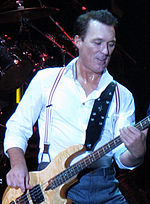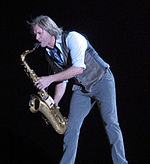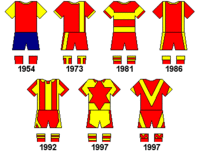- Melchester Rovers
-
Melchester Rovers 
Full name Melchester Rovers Football Club Nickname(s) The Rovers Founded 1885 Ground Mel Park, Melchester
(Capacity: 56,000)Chairman  Roy Race
Roy RaceManager  Roy Race
Roy RaceLeague FA Premier League (fictional) 1999–2000 FA Premier League, 1st (fictional) Home coloursAway coloursMelchester Rovers are a fictional football team with whom Roy Race spent most of his illustrious career in the British comic strip Roy of the Rovers, which first appeared in Tiger at its inception in 1954.
Contents
History
Early years
According to the comic strip's continuity, Melchester Rovers were founded in 1885 winning at least three League Championships and a number of FA Cups during the pre-war years of their existence. In 1954, however, the first Roy of the Rovers strip appeared, telling the story of the club and its star striker Roy Race (whose grandfather, Billy Race, had played for the club in the early part of the 20th Century). Melchester finally became League Champions in 1958, and won the FA Cup the following season, by which time Race was captain.
1960s
It was in the 1960s, however, that Rovers became a footballing force to be reckoned with. The decade brought three league titles, two FA Cups, two European Cups, one European Cup Winners' Cup and one Intercontinental Cup. It wasn't a decade without its problems, though, and in an example of the topsy-turvy nature of the history that would follow, Rovers only narrowly avoided relegation at the end of 1967, the same year they won the Cup Winners' Cup.
1970s
In 1972, Rovers achieved their first – and currently only – League and Cup "Double", and later that year, long-serving team manager Ben Galloway was promoted upstairs to General Manager, with former Rovers winger Tony Storme taking over team affairs. His tenure began well, with a third European Cup win in 1973, and Rovers began the next season with an all-new, modern strip and a strong sense of optimism. Poor results and a spate of injuries, however, meant a demoralising first half of the season, with many of the team believing the new kit was "jinxed". Happily, this was overcome, and despite a disappointing league season, achieved their first domestic cup double, winning the League Cup in addition to another FA Cup. In 1975, though, a humiliating defeat in the 3rd Round of the Cup to non-league minnows Sleeford Town led to the disappearance of manager Tony Storme. Roy Race took over as player-manager, and kept the post when Storme came out of hiding some months later and made his retirement official. Race's Melchester won a trophy at their first attempt, the 1975 Cup Winners' Cup. The first title under Roy came two years later, in 1977, the season in which a supermarket chain offered a (then) staggering £30,000 to the first player in England to score 50 League and Cup goals. The competition went down to the last day of the season, and was won by Mervyn Wallace, despite many fans' belief that Race himself had got the last touch on what would have been his 50th goal. Controversy reigned in 1978, when it was rumoured that Race was due to accept a £1million offer to take over as team manager of Middle-Eastern state Basran. Rovers' form slumped, and Ben Galloway temporarily took back over as manager. However, once the rumours were quashed, Roy was reinstated and Rovers pulled themselves out of the relegation zone, the 1978–79 season ending in style with a UEFA Cup win.
1980s
The 1980s were full of drama with many events of a "soap opera" style, the sort that would eventually inspire series like Sky One's Dream Team. Melchester were League Champions in 1979–80 but were relegated to Division Two by one goal just one year later. The 1981–82 season saw a potential tragedy when Roy was shot by a jealous actor, Elton Blake, who was due to play him in a TV series about the club. Rovers set a new league goal-scoring record – 14–0 against Keysborough – an event that saw Roy recover from his coma when the commentary was played in the hospital. Sir Alf Ramsey managed the club during this period and helped Rovers to set a new league record of 34 games undefeated and comfortably win the Second Division. Roy recovered to start the 1982–83 season where Mel Park becomes Britain's first all-seater stadium. However, in April 1983 Roy sensationally quit Melchester after a row with Rovers chairman Sam Barlow and signed for Walford Rovers. Blackie Gray was appointed new player-manager, but his reign was short-lived, as Roy returned in December 1983 and led an injury-ravaged Rovers to an unlikely FA Cup win over Walford. They followed up this dramatic FA Cup win with an equally dramatic European Cup-Winners' Cup victory on penalties against Real Santana of Spain in 1985 (Rovers would not reappear in Europe for another five years due to English clubs being banned). The following season was an eventful one, as Roy shook up the team by signing retired players turned TV pundits Bob Wilson and Emlyn Hughes, as well as two members of pop group Spandau Ballet! Rovers won the Milk Cup, beating Tynecaster 3–0 and set a new league record of 12 consecutive games without conceding a goal, but in the close season, the club faced its biggest tragedy ever when a terrorist bomb in Basran killed eight team members – Noel Baxter, Vic Guthrie, Steve Naylor, Carl Hunt, Neville Jones, Kenny Logan, Jimmy Slade and Trevor Cassidy. Roy dedicated Rovers' 2–1 Littlewoods Cup Final win over Stambridge City in 1987 to those players. 1987–88 saw the club become League Champions once again, but they were fighting relegation in 1988–89 during a season that saw them play most of their home matches at Wembley Stadium after massive local subsidence during a match led to Mel Park being closed for major reconstruction. Rovers avoided relegation with a 3–1 win over Melboro' in the season's final match.
1990s
Rovers started the decade well by winning the 1990 FA Cup Final, 2–1 against Weston Villa. They were League Champions in 1991–92 while Roy set a new league goal-scoring record, notching up his 436th goal to win a charity bet with former record-holder and now TV pundit "Chippy" Croker (an obvious analogue for Jimmy Greaves). 1992–93 saw a season of turmoil when Roy resigned as manager live on Sky TV. He returned before the end of the season, but on the way to scout a promising youth player, crashed his helicopter and was left in a coma and badly injured. He recovered in time for the 1993–94 season, but learned that his left foot had been amputated. Recovering, he left England to become manager of Italian side AC Monza. With his departure, Rovers' fortunes became bleaker, occasional moments of brilliance from players such as Roy's son "Rocky" Race and the Nigerian Paul "Del" Ntende shining among the troubles, which included now-manager Blackie Gray resigning after receiving death threats, and the club only narrowly avoiding relegation in the 1993/94 season, with Rocky scoring a last-minute goal to save them. However, soon after that match a Melchester Director was found guilty of attempting to bribe the opposition to throw the game. They won the FA Cup in 1995 but, after the death of Rocky's mother Penny in a car crash in Italy, Rocky quit Rovers to join fierce local rivals Melborough. 1995–96 was a complete disaster for Rovers as more top players left after a bribery scandal shamed the club, and they were relegated at the end of the season into Division One. In 1996–97, Roy Race Sr. returned to manage the club, and arrived in time to save the Rovers from an impending second successive relegation. In 1997–98, Rovers finished the season fourth in Division One but won in the play-offs to gain promotion back to the Premier League. Following Rocky's transfer back to the club, they won the 1999 FA Cup in extra time, and the turnaround was complete in 1999–2000, when they won the Premier League title on the last day of the season, their first top-flight title in eight years and their most recent to date. The following season, Race was finally able to buy out the club's owners, the Vitner brothers, and the club began to look forward to the new millennium, with a planned move to an exciting new stadium under the ownership of their greatest hero.
Colours and kits
Melchester Rovers' colours have always involved some combination of red and yellow, although as with real life professional teams, their precise shirt designs have varied considerably over the years.
When the comic was first introduced, the club played in plain red shirts with yellow sleeves, and navy blue shorts. This strip persisted for many years, until a dramatic new look was introduced in 1973. This involved an all-red strip, with a yellow vertical stripe running down one side of the shirt, one on the other side of the shorts, and a yellow "T"-shape on the socks. In addition, the shirts uniquely featured the players' numbers on one sleeve. This kit was worn until 1981, when Rovers were relegated to the Second Division, and switched back to a more conventional, symmetrical design. This shirt featured yellow bands across the chest, waist and sleeves, and would remain until 1986, when following the drastic rebuilding of the team a fresh new kit was introduced, this time all-red with a narrow yellow stripe running down each side. Then in 1991, a competition was held for Roy of the Rovers readers to design a new kit for the team. The winning entry was a simple and classic combination of yellow and red stripes with red shorts. Variations on this kit (sometimes using more yellow than red) would continue to be used until the end of the weekly comic, and for the duration of the subsequent monthly one. However, when ROTR strips returned in Match of the Day Magazine in 1997, a new kit had been introduced. Unusually, this kit was predominantly yellow, with a large red star motif across the chest and back. This strip did not last long, however, as the following season another strip appeared. This was again all-red, with yellow trim, and a predominant yellow "V" shape across the front and back of the shirt. This was the last kit that Melchester have been seen to play in.
Away strips were not seen very often in the ROTR comic, but three main designs were used, particularly in the 1980s – a plain blue shirt with white shorts and red socks, a yellow shirt with a red stripe running down its side with yellow shorts with a red line running down its other side and an all-white kit that also sometimes employed red socks. After 1992, Rovers away kits would generally be all-white with some combination of yellow and red trim, and in the Match of the Day strips the same design as the home kit, in white and red, was used.
As in real football, shirt sponsorship logos were non existent prior to the 1980s, and when eventually introduced to the strip, their use was intermittent. The first genuine commercial logo, that of Gola appeared on the new kit in 1981 but disappeared the subsequent year. The 1986 kit first appeared with Nike branding, but again this would be removed after one season. The shirts were blank for a while, but in the last couple of years saw the comic's publishers Panini and Fleetway used. When the striped kit was introduced in 1992, meanwhile, it featured Sega as the sponsors. This deal only lasted for a season, however, and for the last season portrayed by the weekly comic TSB appeared on the shirts. This deal carried over to the monthly comic, after which for a short time the shirts were again sponsorless, before a deal with Subbuteo saw that brand appear for the final few issues. The predominantly yellow kit introduced in Match of the Day magazine saw MotD itself as the sponsor, only to be replaced by McDonald's after only two episodes. This latter instance marked perhaps the first time Melchester's shirts made use of appropriate corporate colours!
Honours
Note that all records are fictional, and only date as far as 2000, the last completed season of the comic strip.
- First Division and Premier League[1] titles : 13
- 1932, 1934, 1938, 1958, 1960, 1963, 1968, 1972, 1977, 1980, 1988, 1992, 2000.
- Football League Second Division: 1
- 1982
- FA Cups: 11
- 1907, 1959, 1961, 1966, 1970, 1972, 1974, 1984, 1990, 1995, 1999
- League Cups: 3
- 1974, 1986, 1987
- European Cups: 3
- 1964, 1969, 1973
- UEFA Cups: 1
- 1979
- European Cup Winners' Cups: 4
- 1967, 1971, 1975, 1985
Opponents and rivalries
Although throughout Roy Race's playing career there was never a definitive list published of who the other teams in the First Division were, the majority of sides Rovers played against were familiar names who they opposed regularly in later years. These included: Blackport, Burndean, Carford City, Castlemere, Danefield, Deans Park, Eastoke, Gatesfield, Holverton, Kelburn, Kingsbay, Melborough, North Vale, Oldfield, Portdean, Redstoke, Stambridge City, Tynecaster, Walford Rovers (who Roy managed in 1983) and Weston Villa (also known as Western Villa). There were also several lower league sides who Rovers met in cup football and their occasional stints outside the top-flight, as well as foreign teams in European matches.
For much of the story's history, Rovers' traditional local rivals were Melborough (sometimes shortened to Melboro). For decades, Melchester held the upper hand over their cross-city neighbours, but in later years Melborough became a major force and were in a higher division than Rovers in the late 1990s. Melborough often had outspoken managers, most notably Andy Jackson and Ralph Gordon (who made an ill-fated and unpopular switch to Rovers in 1992), to help intensify the rivalries.
The monthly comic (1993–95) changed the sides Rovers played, basing them on real-life clubs (Toxteth being Liverpool; Prestwich North End replacing Manchester United etc). The comic featured Melchester City as ambitious Football League newcomers who believed they could ultimately compete with Rovers. However, they did not reappear in any future Roy of the Rovers storylines, and nor did the other sides Rovers faced in this period.
Notable players
 Roy Race
Roy Race William "Blackie" Gray
William "Blackie" Gray Geoff Giles
Geoff Giles Dave Williams
Dave Williams Jim Hallett
Jim Hallett Bob Roberts
Bob Roberts Bomber Reeves
Bomber Reeves Buster Brown
Buster Brown Tony Storme
Tony Storme Ossie Jones
Ossie Jones "Lofty" Peak
"Lofty" Peak "Tubby" Morton
"Tubby" Morton "Jumbo" Trudgeon
"Jumbo" Trudgeon Mervyn Wallace
Mervyn Wallace Charlie "The Cat" Carter
Charlie "The Cat" Carter Vic "Superbrat" Guthrie
Vic "Superbrat" Guthrie Paco Diaz
Paco Diaz Vernon Eliot
Vernon Eliot Nat "Grandad" Gosden
Nat "Grandad" Gosden Martin Kemp
Martin Kemp Steve Norman
Steve Norman Bob Wilson
Bob Wilson Emlyn Hughes
Emlyn Hughes Duncan McKay
Duncan McKay Johnny "The Hard Man" Dexter
Johnny "The Hard Man" Dexter Steve "Nobby" Wootten
Steve "Nobby" Wootten Andy MacLaren
Andy MacLaren Karl Bruckner
Karl Bruckner Paul "Del" Ntende
Paul "Del" Ntende Roy "Rocky" Race Jr.
Roy "Rocky" Race Jr. Roberto Angel Munoz ("Malandro")
Roberto Angel Munoz ("Malandro")
Managers
- Ben Galloway (up to 1973)
- Tony Storme (1973–1975)
- Roy Race (1975–1978)
- Ben Galloway (1978)
- Roy Race (1978–1982)
- Sir Alf Ramsey (1982 – caretaker)
- Roy Race (1982–1983)
- Blackie Gray (1983)
- Roy Race (1983–1992)
- Mervyn Wallace (1992 – caretaker)
- Ralph Gordon (1992–1993)
- Roy Race (1993)
- Mervyn Wallace (1993 – caretaker)
- Blackie Gray (1993–1995)
- Mervyn Wallace (1995 – caretaker)
- Roy Race (1996 – )
See also
Notes
- ^ Up until 1992, the top division of English football was the Football League First Division; since then, it has been the FA Premier League.
References
- Official Roy of the Rovers Website
- Acton, P, Jarman, C.M, Roy of the Rovers : The Playing Years (Queen Anne Press, 1994) ISBN 1-85291-548-X
- Roy of the Rovers on BritishComics.com
- Roy Race "interview" from The Guardian
- "He shoots... he scores!"
- Melchester Rovers – GREEK
Categories:- Fictional association football clubs
- First Division and Premier League[1] titles : 13
Wikimedia Foundation. 2010.



